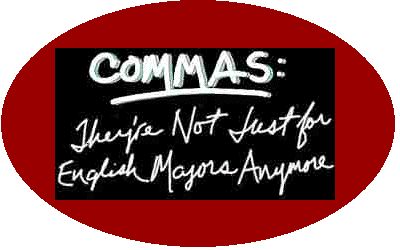
|
|
A Few Other Situations
|
Quotations Another
situation that causes a lot of confusion is using commas with quotes and
quotation marks. DO NOT automatically use a comma every time you
quote something.
Here are four quick tips:
- Use commas to set off quotes off from
the words used to introduce or identify the source:
Bambi cried, "Oh no! Godzilla!"
- Do NOT use a comma, however, when the sentence includes MORE
THAN the quote and the words used to introduce it:
Bambi cried "Oh no! Godzilla!" a moment too late.
The astronaut
shouted "Hold it! I quit!" three seconds before ignition. - Do NOT use a comma when a quotation is introduced by the word,
"that."
- When a quotation requires a comma at the end (such as when it's part of an introductory element), the comma ALWAYS goes INSIDE the quotation marks - NEVER OUTSIDE.
When the captain shouted "Pancakes for everyone," the crew
went crazy for joy.
In the song "The Monkeys Cried at Midnight," the girls' father sang of his sad childhood.
Items in a series (more than two items)
- When listing items in a series, do not place
a comma after the last item:
Bluey, The Chosen, and American Horror Story are my grandma's
favorite shows.
- Placing a comma after the next-to-last item
is optional, but sometimes necessary for clarity.
confusing: Jenny has worked
for many gun manufacturers, including Browning, Winchester and Smith and
Wesson.
clear: Jenny
has worked for many gun manufacturers, including Browning, Winchester, and
Smith and Wesson.
(The added comma in
the "clear" sentence makes plain that Winchester is distinct from Smith and
Wesson.)
Rule of thumb: Pick a style and be consistent within a document.
Interjections
- Use commas to set off interjections (unless the situation requires an exclamation mark or question mark).
Ouch, quit stepping on my face. ("Ouch! Quit stepping on my face!" would work as well)
Hey, that really hurts.
Why, I outta murder youse guys.
Direct Address
- Use commas to set off direct address (when one party is directly addressing another).
My friends, we must throw these fish immediately.
Please, Aunt Mozo, not in the face!
Whoa, dude, take a bath.
|